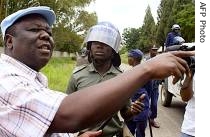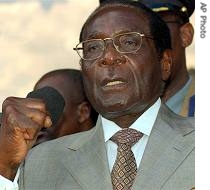2007年VOA标准英语-South Africa's Mbeki Lays Groundwork for Stabil(在线收听)
Johannesburg
19 April 2007
Last month, Southern African leaders appointed South African President Thabo Mbeki their mediator to facilitate talks between Zimbabwean President Robert Mugabe and opposition groups in his country. The goal is to end the political crisis in Zimbabwe, prepare for free and fair elections as early as next year, and lay the groundwork for an economic recovery program. In this report from our southern Africa bureau in Johannesburg, VOA's Delia Robertson takes a closer look at how the facilitation might work and what its chances of success are.
Zimbabweans wondering what President Mbeki has in mind for negotiations in their country need look no further than South Africa itself. The blueprint Mr. Mbeki will be working from is the one that brought an end to apartheid in South Africa.
But Mr. Mbeki will not be seeking to impose the same final model on Zimbabwe that South Africans chose. Rather he will be asking them to use similar methods. This means having talks with as wide a range of interest groups as possible, each with an equal standing, discussing and debating, giving and taking, until consensus is reached.
 |
| Zimbabwe's leader of the Movement for Democratic Change (MDC), Morgan Tsvangirai, argues with a policeman after being told he could not hold a rally in Harare, 18 Feb 2007 |
But Chris Landsberg, director of Johannesburg's Center for Policy Studies, says that looming large over all Mr. Mbeki's plans is President Robert Mugabe, who he says has, on four previous occasions, obstructed regional initiatives to end the crisis in Zimbabwe.
"But since 2000 SADC in general - South Africa in particular tried to do something - they have consistently offered something since 2001, they have offered something in 2002, 2003 - we know about the significant offer in 2005 where South Africa even offered a loan package as much as $1 billion in exchange for political concessions," he said.
Mr. Mbeki has set himself a tight timeline. He would like an agreement between the parties early enough to allow adequate preparations for an election next March that will be viewed as free and fair not only by all the parties in Zimbabwe and by Southern African leaders, but also by the international community. Landsberg warns that Mr. Mugabe is likely to resist for as long as possible.
 |
| Zimbabwean President Robert Mugabe addresses party supporters in Harare, 30 Mar 2007 |
Landsberg argues that Mr. Mugabe will likely want to postpone elections until 2010, the latest possible date they could be held under the current constitution. He says that this will enable Mr. Mugabe to delay identifying his successor, because, he says, once this happens, Mr. Mugabe will lose whatever control he has left within ZANU-PF, his own party.
"At some point he is going to anoint a successor," he explained. "And, of course, he is going to go for somebody who is likely to be seen by him as a puppet. And instead of that power working in his favor, people will then say this is it, he is now weakened, then they will really push him out."
But other experts, such as Chris Maroleng of the Institute for Security Studies in Pretoria, say that the confluence of events in Zimbabwe and the region in recent months may be enough to propel Mr. Mugabe to fall into line on the timeline set by southern Africa leaders for completion of the mediation.
Maroleng argues that the octogenarian leader has never before had such poor support within his own party. Also that he has never previously had to face a united opposition from southern Africa leaders, as he did last month in Dar Es Salaam.
"If he yet again scuttles such an opportunity, this would create the impression in the region that he doesn't take his counterparts seriously," he explained.
Following the Dar Es Salaam meeting, the leaders issued a statement that expressed support for Mr. Mugabe and also called on western countries such as the United States and the United Kingdom to abandon so-called smart or targeted sanctions against Zimbabwe. Maroleng says that it has become common knowledge that in the privacy of the meeting, Mr. Mugabe was subjected to severe criticism from the regional grouping. He says their call for an end to sanctions was a device to prevent Mr. Mugabe from finding excuses to avoid or delay the mediation.
"The fact that they are distancing themselves from a western approach to regime change is a clear indication that the southern African development community is really preparing the groundwork for a mediation in Zimbabwe and closing any exit that Mugabe has taken where he has [in the past] consistently accused any mediator as puppets of the west or neo-colonial lackeys of the west," he said.
Like all previous initiatives, the current effort will likely include an offer that will allow Mr Mugabe to retire gracefully without the threat of being brought on charges before the International Criminal Court or even before Zimbabwe's own courts for crimes against humanity.
To satisfy Zimbabwe's opposition, Mr. Mbeki will have to find a way to ensure that pre-election campaigning and the elections themselves are overseen by an independent electoral commission supported by a peacekeeping body, such as the Peace Commission which operated in South Africa in 1994. In addition, opposition groups also want the support of southern African and western observers.
Any agreement will also include an economic recovery program designed to kick-start Zimbabwe's ailing economy as quickly as possible. That will require the support of the international community, particularly the industrialized nations, and Mr. Mbeki will be keenly aware that this support will not be forthcoming unless the agreement meets their criteria for free and fair elections.
Mr. Mbeki has appointed two seasoned South African facilitators who have already held several meetings with representatives of the two factions of Zimbabwe's Movement for Democratic Change and with representatives of some Zimbabwean civil society groups.
The facilitators will draw up a draft agreement, and when that is ready in the coming weeks, Mr. Mbeki will want to present it to Mr. Mugabe. It is at that point, that Zimbabweans and regional leaders will get their first indication of whether or not Mr. Mugabe intends to fully cooperate with the Southern Africa Development Community's mediator.